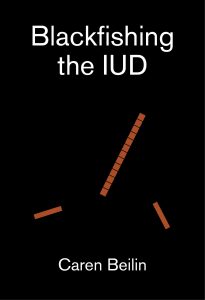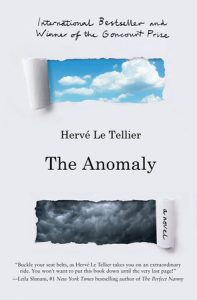Nonfiction. 165 pgs. Wolfman Books. October 2019. ISBN: 978-1-733276-11-5.
Caren Beilin’s Blackfishing the IUD is a compact puzzle that draws into it everything from the works of Walter Benjamin to corporate medical research to the polyvocal democracy of the Internet to coffee enemas. Simultaneously in the tradition of illness memoirs and a challenge to the conceit of many illness memoirs that take for granted doctor/patient relationships, the book engages with its contemporary moment—one of fracture, disillusionment, and rage—with a multitude of sources that reflect the moment’s urgency.
The book is interspersed with testimonies from other women who tell similar stories of neglect and gaslighting in the medical profession. However different their voices are, there is a unifying sense of injustice that threads together the chorus that Beilin curates.
Polyvocality is just one contemporary device Beilin pulls in. The title comes a new work, to blackfish, meaning “to destroy a cultural notion of normalcy around something, as the 2013 documentary Blackfish did for whales in captivity” (9).
What I find so engaging in Beilin’s approach to this stated act of destruction for a well-regarded and seemingly liberating medical procedure is that it requires, in essence, the creation of a new story, stitched together from theory, literature, art criticism, testimony, memoir, and Beilin’s brilliant juxtaposition of all these constituent elements into a cohesive whole. Her blackfishing here is not so much a protest as it is a directed sabotage against the coalition of capitalism, medicine, and patriarchy that allows for the interpersonal dehumanization she and others face in the medical industry. She tackles this coalition with an intellectual and interpersonal coalition of her own, built through juxtaposition. In one instructive passage, she writes:
I am in less pain now than I was then.
I am in more awareness of my lesser pain. I am in more fear, about the future, than ever.
Canguilhem—who wrote about doctor/patient relations as the world was burning down, during the active years of Dr. Mangele, when doctors could openly (enthusiastically) substitute impetuous, murderous curiosity for any curing at all—mulls the possibility of a society which, ‘has a health organization at its disposal that exploits the most sophisticated information about the distribution and correlation between factors that cause disease, in order one day to relieve the doctor of the often desperate task of helping individuals deal with the distress of their anxious struggle for an aleatory cure.”
He was a doctor in the resistance.
The IUD was a factor in my RA (122).
I’m struck reading this passage not by what it destroys but what it hopes to create in the process of destruction, of blackfishing. Beilin has the final word here on the role of the patient, which is to speak and be heard.
Beilin unpacks a long, complex history in which medicine is practiced without the full consent of patients, who are relegated to a secondary position. For her, it is not a coincidence that women who practiced medicine independently were pushed to the margins of western society and labeled witches, which she juxtaposes with her work at a bookstore recommending titles: “A blessing witch heals not by medical dogmas but through collected stories—what has worked, what has helped? A witch stretches help off of narrative looping. I ask a customer, ‘What have you read?” (107).
By engaging stories, by looping and threading together narratives and testimonies and theories, Beilin enacts a sense of independence that, shortly after publication, may feel dubious to readers. I picked up the book in a bookstore while wearing a mask in a state populated by people who eschew mask-wearing despite the scientific consensus in favor of masks as the best way to stop the spread of the coronavirus. Beilin is not one of these naysayers. Today, as a well-spoken physician urges us to trust the science, I think it would be a gross misreading to interpret Blackfishing the IUD as a statement in defiance of that kind of trust. Instead, Beilin asks us to consider another request just as urgently: Trust the patient. Care for the patient. Listen to the patient.
Blackfishing the IUD is rich with provocation. Beilin’s intellection provides readers at times with puzzles, at times with grief, often in a voice that is bored with having to repeat the same pleas again and again. The last line of the book proper: “It makes me dream of Positano, and, you know, justice” (157). Like a director cutting scenes together for a montage, Beilin is at the center of the text pulling together its elements, rendering something new and nuanced, and in case you need to hear it again, something about justice.
Blackfishing the IUD is available through Wolfman Books. Purchase it now through their website.
KEENE SHORT is a writer in northern Idaho. His recent work has appeared in High Desert Journal and Tupelo Quarterly. He has more at keeneshort.com
Like what you’re reading?
Get new stories or poetry sent to your inbox. Drop your email below to start >>>
OR grab a print issue
Stories, poems and essays in a beautifully designed magazine you can hold in your hands.
GO TO ISSUESNEW book release
China Blue by Catherine Gammon. Order the book of which William Lychack Jeffries calls “a fiery declaration of all that is inexpressible about desire and loss and the need to find a home in a world in which even the most solid and real of things feel often less than completely solid or real.”
GET THE BOOK



